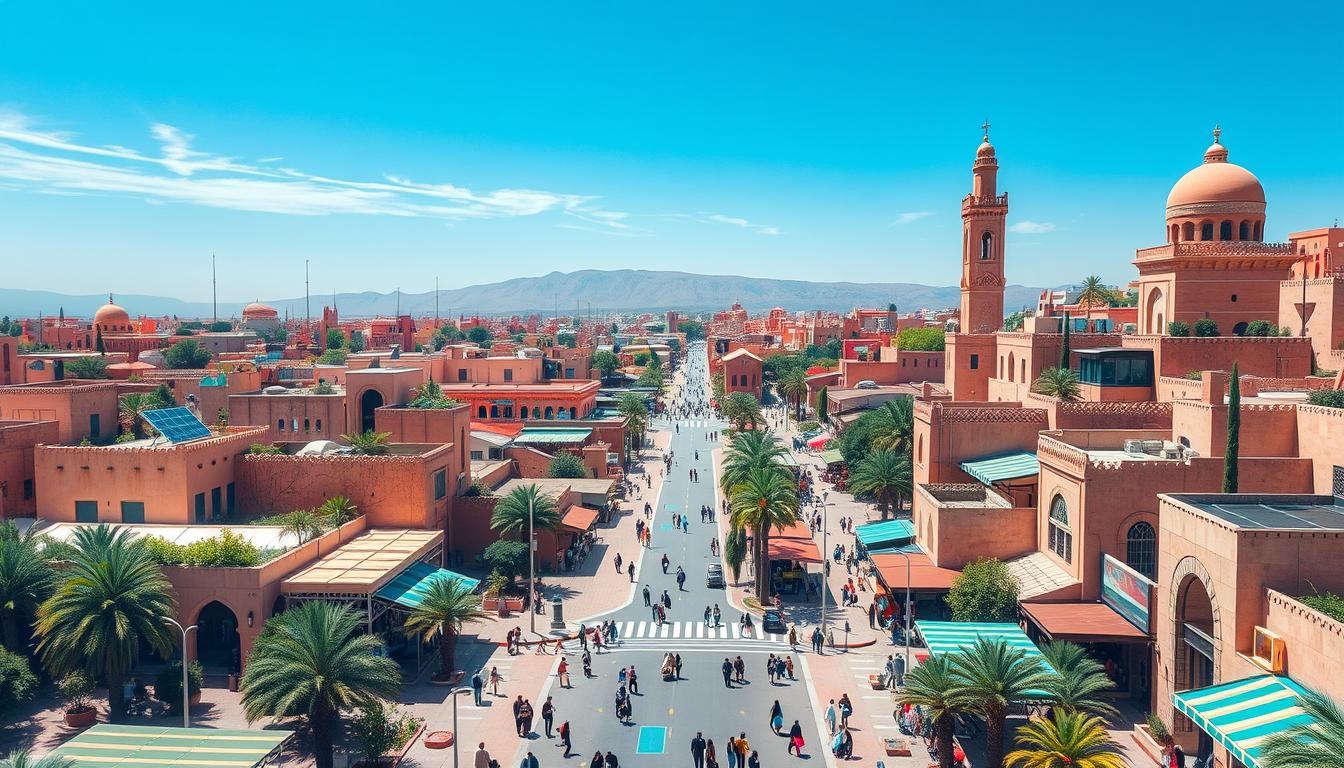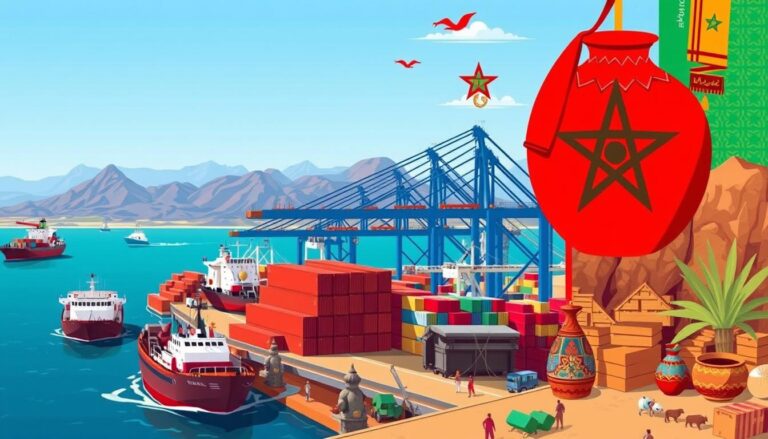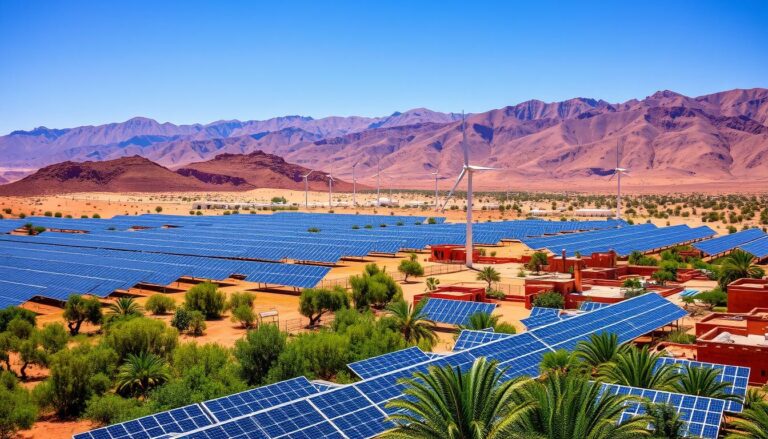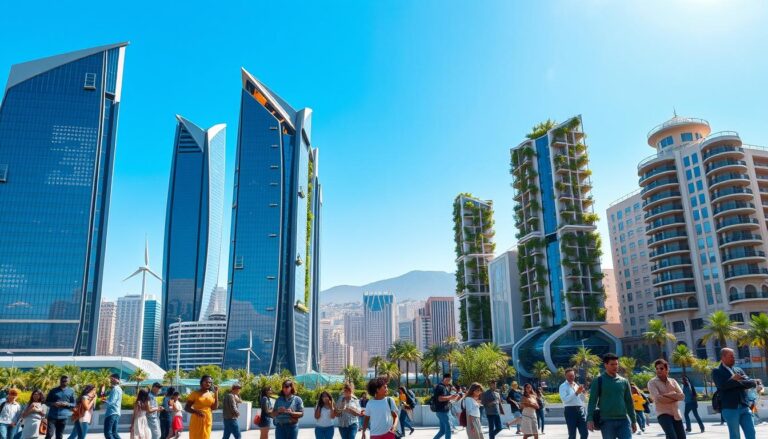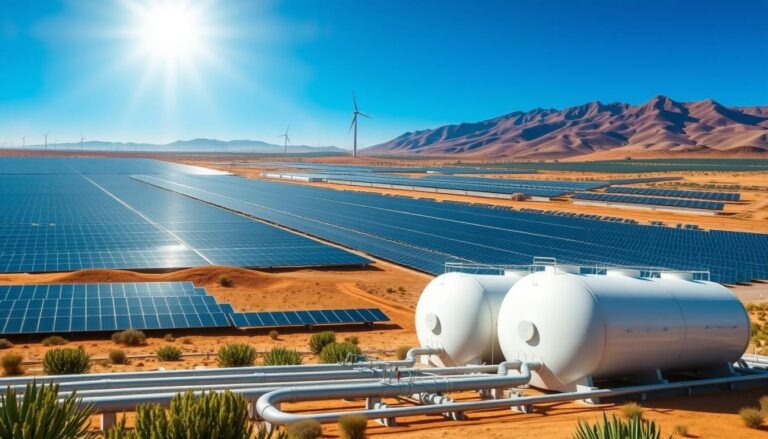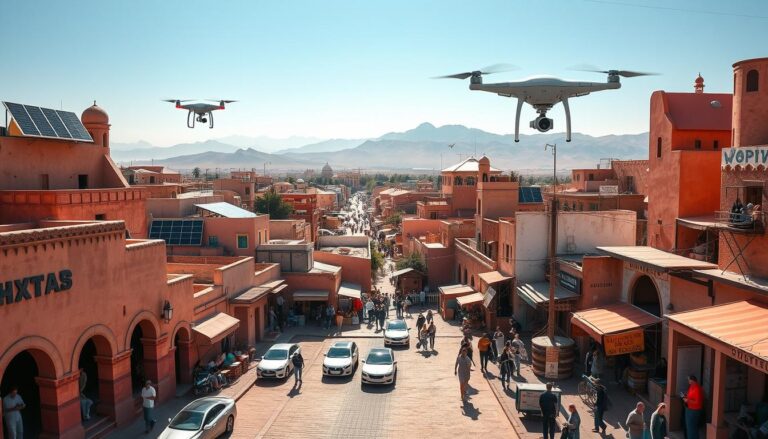Can Marrakech truly become a leader in sustainable infrastructure and revolutionize Morocco’s energy transition?
Morocco is making big moves towards using smart grid technology in its energy systems. The U.S. Trade and Development Agency (USTDA) is watching closely. They gave Marrakech’s RADEEMA a grant to study how to make things better.
This study is being done by Africa Climate Solutions. It aims to make energy use more efficient. It also wants to use more renewable energy and cut down on energy loss in cities.
With big goals like increasing renewable energy to 52% by 2030, Morocco’s energy shift is crucial. Buildings use a lot of electricity, 28% to be exact. Smart grids could change things a lot, especially in the Marrakech smart city project.
Introduction to Smart Grid Technology
Smart grid technology is a big step up in how we get and use electricity. It uses advanced systems to watch and control electricity in real time. This makes power distribution more efficient and reliable.
It also makes it easy to use energy from the sun and wind. This is thanks to efforts to modernize the grid.
What is a Smart Grid?
A smart grid uses digital tech to keep an eye on and adjust to changes in electricity use. It lets utilities and customers talk to each other, improving how energy is managed. This is different from old grids, where electricity was just sent out without checking if it was needed.
In Morocco, 90 percent of energy comes from imports. They want to use more renewable energy, like solar and wind, by 2030. With lots of sun and wind, smart grids are key to using these resources well.
Benefits of Smart Grids
Smart grids offer many benefits, like using less energy and making power cleaner. They also help avoid power outages and reduce energy loss. These are big problems in old power systems.
Smart grids also help use renewable energy better. Morocco already uses 38 percent of its power from renewables. This is a big step towards their goal of using 20 percent less energy by 2030.
In short, smart grid tech and energy management systems are crucial for Morocco’s energy goals. They help the country move towards a sustainable and strong energy future.
The Role of USTDA in Morocco’s Smart Grid
The U.S. Trade and Development Agency (USTDA) is key in Morocco’s effort to update its electrical grid. It uses smart grid technologies. U.S. energy partnerships help both countries grow and improve technology together. The USTDA gives financial help and support, focusing on green and efficient energy projects worldwide.
Grants and Support
The USTDA helps Morocco a lot with smart grid funding. It has helped over $119 billion in U.S. exports to new markets. They offer money, technical help, and training. This support lets Morocco use the best U.S. technology for a green and smart grid.
Key Objectives
The USTDA works with RADEEMA, Morocco’s electric company, on important goals. They aim to start a clean energy future by adding green energy to the grid. They also want to use U.S. technology and practices, boosting energy cooperation between countries. These steps help Morocco build a strong, efficient, and ready-for-the-future energy system.
RADEEMA’s Contribution to Grid Modernization
RADEEMA is leading the way in modernizing the Marrakech grid. They are working closely with Africa Climate Solutions. This partnership is a big step towards developing smart grid infrastructure.
Feasibility Study by Africa Climate Solutions
Africa Climate Solutions has done a feasibility study. It looks at how to use renewable energy better. The goal is to make the grid more efficient and green.
The study’s results will guide important steps. These steps will help add renewable energy to the grid smoothly.
Integration of Renewable Energy
Renewable energy is key to Marrakech’s smart grid. Morocco wants to use more energy efficiently and cut down on losses. RADEEMA is working on this by installing rooftop solar panels.
This effort will help Morocco reach its goal of using 47.189% of its energy from storage by 2025. It will make the grid modern and support green energy in the area.
Marrakech: The Pilot City for Smart Grids
Marrakech is leading Morocco’s energy shift. It’s the first city for a smart grid program. This move makes Marrakech a top example in green city planning.
Project Scope and Goals
The Marrakech project aims to change the city’s power system. It wants to make it smarter and more efficient.
- Reduction of Power Losses: The goal is to cut down on lost electricity. In Africa, about 20% is lost. Marrakech hopes to do much better.
- Integration of Renewable Energy: The project will use local solar power. The Noor Solar Complex in Ouarzazate already makes 160 MW.
- Enhanced Grid Resilience: The plan is to make the grid stronger. This will reduce power cuts and meet the growing demand for electricity.
- Consumer Engagement: Smart meters will give people control over their energy use. This will help them use less.
Expected Outcomes for Marrakech
The smart grid project has big goals for Marrakech. It aims to make the city more sustainable.
- Reduction in Power Outages: The new grid should cut down on power cuts.
- Increased Use of Renewables: Marrakech wants to use more solar and wind power. This supports Morocco’s goal of 42% renewable energy by 2020.
- Enhanced Energy Efficiency: Smart meters will help people use energy wisely. This will make the city more efficient.
- Environmental Impact: Using less imported oil will help the environment. It’s good for Marrakech’s green goals.
This project in Marrakech is a big step for Morocco’s energy future. It shows the city’s commitment to being green and self-sufficient.
Opportunities for Other Moroccan Cities
Marrakech is leading the way in changing its power system to a smart grid. This move is a great example for other Moroccan cities to follow. It shows how to make cities more energy-efficient and sustainable.
By 2018, Morocco had electrified 99.43% of its people. This makes it easier for cities like Marrakech to use smart grid technology. It helps make energy use better and more reliable.
The Moroccan government plans to spend more on clean energy research. They want to double it to €80 million by 2023. Cities like Casablanca, Rabat, and Tangier can use this money to get smart grid technology. This will help Morocco reach its goal of 52% renewable energy by 2030.
Morocco is setting up places for research like the Green Energy Park. These places help cities move forward in clean energy. The Institute for Research in Solar Energy and New Energies (IRESEN) also helps with research.
Morocco is working with the IEA to share knowledge and build skills. This makes it likely that all Moroccan cities will have a smart grid soon. It will be a modern and strong system for everyone.
Renewable Energy Integration
Morocco is leading the way in clean energy, focusing on rooftop solar and other green solutions. The goal is to blend Moroccan solar power into city life. This aims to support sustainable growth and make energy systems more reliable.
Rooftop Solar Integration
Rooftop solar is key to Morocco’s plan. It turns rooftops in cities into energy sources. This move not only boosts clean energy but also lets people and businesses help make the grid greener.
“The rooftop solar initiative is a pivotal step towards creating renewable urban energy ecosystems,” said a project spokesperson.
Other Renewable Sources
But rooftop solar isn’t the only thing. Wind, hydro, and biomass energy are also crucial. They help make the energy mix more diverse. This makes the energy system more stable and less dependent on fossil fuels.
- Wind Energy Integration: Using both offshore and onshore wind to support Moroccan solar power.
- Hydropower Utilization: Improving current hydropower plants and finding new ones.
- Biomass Energy: Turning organic waste into energy, promoting green living.
Morocco’s use of solar power and other renewables shows a big step towards a greener future. It’s a model for other cities to follow.
Reducing Power Outages and Network Losses
Morocco is focusing on cutting down power outages and network losses. This is part of their plan to make energy reliability better, increase smart grid efficiency, and improve power quality. They believe advanced smart grid technology is the key to solving these problems and making the electric grid stronger.
After implementing smart grid technology in Chattanooga, Tennessee in 2009, power outages decreased by 55%.
Morocco’s smart grid plan is expected to bring similar benefits. They will use the latest smart grid solutions. The expected gains include:
- Enhanced energy reliability: New technology will make the grid more resilient. This means fewer and shorter power outages.
- Smart grid efficiency: The grid will run better with real-time data and automated systems. This will lead to a more stable power supply.
- Power quality improvement: With less interruptions, power will be delivered consistently. This will improve service quality for everyone.
Also, using renewable energy like solar and wind is key. Morocco wants to get 52% of its power from renewables by 2030. This will help reduce carbon emissions and make the grid more reliable and efficient.
By using smart grid solutions, Morocco is ready to face the challenges of electricity distribution. They are also setting an example for other areas looking to improve their grids.
Economic and Regulatory Framework
Morocco aims to increase its use of renewable energy. This requires a strong economic and regulatory framework. The plan includes using renewable resources and making sure investments are profitable.
This approach ensures that the investment in modernizing the grid meets national and global standards.
Master Plan by EDF IN
The Master Plan by EDF IN is key to Morocco’s energy shift. It aims to improve the grid by 2027. It uses predictive analytics to find the best investments.
The plan includes detailed cost analyses. By 2030, Morocco wants 52% of its electricity to come from renewables. This shows the importance of a well-thought-out plan.
Investment Strategies
Morocco’s success in modernizing its grid depends on smart investment strategies. The country has a good legal setup for investors. This has brought in a lot of foreign investment in areas like renewable energy and infrastructure.
Spain plans to invest €45 billion by 2050 in transport and renewable energy. France is financing a 3GW power link to Western Sahara. These partnerships are helping Morocco’s energy infrastructure.
Independent Power Producers (IPP) are also crucial. They are behind 18% of Morocco’s solar power and 17% of its wind power in 2024.
Morocco is a key business hub in the region. It has strong trade ties with the European Union and encourages foreign investment. The Master Plan by EDF IN is set to help Morocco reach its renewable energy targets. It will drive economic and infrastructural growth while following energy regulations.
Smart Meters and Consumer Benefits
Smart metering technology is key in Morocco’s move towards better energy management. These devices give users real-time energy usage data. This helps make bills more accurate and lets people make smarter choices about their energy use.
But, there are hurdles to overcome. About 7 million smart meters might not work when old cellular networks are shut down. Also, around 9% of smart meters don’t work right. Some areas, like London, and remote places have fewer smart meters.
Young people, women, and those with lower incomes are also slower to get smart meters.
Smart meters bring many benefits, such as:
- Automated meter readings
- Variable usage-based billing
- Improved transformer load management
- Enhanced event handling
But, there are big challenges like RF emissions and security worries. Getting these projects right from the start is key to their success.
Smart meters help manage energy better and offer data for changing prices. But, they can also be expensive to replace. To really help consumers, we need to tackle these problems.
“Smart meters, by enabling efficient energy management, are the stepping stones towards a sustainable and user-centric energy future.”
Challenges and Solutions in Grid Infrastructure
Morocco is working on smart grid projects, but faces many challenges. These include both technical and non-technical hurdles. It’s important to tackle these issues to make these projects successful.
Technical Challenges
One big technical challenge is integrating new technologies with old systems. This includes smart meters and renewable energy like rooftop solar. It’s also important to protect the grid from cyber threats.
In Ukraine, a cyberattack in 2015 left 230,000 people without power for hours. This shows how crucial grid security is.
Another challenge is making the grid more resilient to climate change. Morocco’s temperature has gone up since the 1990s. It could rise by up to 6.25°C in the future.
Non-Technical Challenges
Non-technical challenges include regulatory frameworks and getting consumers on board. For example, the GDPR in Europe makes data management in smart grids harder.
Getting people to accept new technologies is also a big issue. In India, the cost of updating the grid has been a major barrier.
Regulatory challenges are also a big deal. The U.S. energy infrastructure got a D+ in 2021, showing it needs a lot of work. The EU is investing in smart grid research to help solve these problems.
To move forward, Morocco needs a good plan and enough resources. This will help make its smart grid projects work well in the long run.
Energy Efficiency and Sustainable Development
Morocco is committed to energy efficiency and sustainable development. It has big plans for renewable energy and smart grids. These plans will help the country’s energy and economy in the long run. They create a strong base for a greener and more stable future.
Long-Term Impact
The impact of smart grids in Morocco is huge. The goal is to use over 52% renewable energy by 2030. This will cut down greenhouse gas emissions and make energy more secure.
Thanks to new tech like AI and IoT, homes are now 20% more energy-efficient. Buildings also use 30% less energy with smart shading. The Tarfaya Wind Farm and Noor Ouarzazate Solar Complex show how renewable energy can boost Morocco’s economy and meet its sustainable goals.
National Energy Strategy
Morocco’s national energy strategy focuses on sustainable energy. It plans to invest MAD 23 billion in green energy from 2023 to 2027. This has led to a 25% drop in energy use in government buildings.
The private sector is also playing a big role. It has developed over 50% of wind energy projects. This shows how sustainable energy can drive economic growth. The strategy also aims to create jobs, helping the economy grow sustainably.
Source Links
- Promoting Smart Microgrids in Morocco
- An Outline of the Recent Developments, Key Drivers, and Recommendations for Future Implementation
- Morocco – Energy
- Challenges in Implementing Smart Grid Technology
- USTDA – United States Trade and Development Agency
- U.S.-Caribbean Partnership to Address the Climate Crisis 2030 – United States Department of State
- Power Africa 10th Anniversary | Power Africa | U.S. Agency for International Development
- Optimal renewable resources mix for low carbon production energy system in Morocco – Energy Informatics
- Distributed Energy Resource Management System Market [2030]
- What happened at COP22?
- Smart grids take off in Africa – Africa Solutions Media Hub
- Plans and priorities – Mission Innovation
- Morocco – Infrastructure
- USTDA backs Radeema smart grid in Morocco – IoT M2M Council
- USTDA Supports Morocco’s First Smart Grid Deployment – USTDA
- USTDA Supports Morocco’s First Smart Grid Deployment
- Morocco’s path to a climate-resilient energy transition: identifying emission drivers, proposing solutions, and addressing barriers
- Smart grid tech to ensure grid stability in extreme weather – Power Technology
- PowerPoint Presentation
- Morocco’s Energy: Legal Framework & Investment Insights
- Just Energy Transitions? Lessons From Oman and Morocco
- Sustainable Transformation of Morocco’s Energy System
- Smart Meters: The Future of Energy or a Technological Misstep?
- Investment Opportunities in Morocco’s Energy Sector
- Activity and efficiency of the building sector in Morocco: A review of status and measures in Ifrane

The Editorial Team is a passionate group of Morocco enthusiasts dedicated to sharing the beauty, culture, and wonders of this captivating country. With diverse backgrounds and a deep love for travel, we strive to bring you engaging and informative content that inspires your Moroccan adventures. From uncovering hidden gems and sharing local insights to exploring mouthwatering cuisine and showcasing the vibrant lifestyle, our team is committed to providing you with valuable resources and exciting stories that enhance your exploration of Morocco. Join us on this journey as we celebrate the rich heritage and unforgettable experiences that make Morocco truly special.

